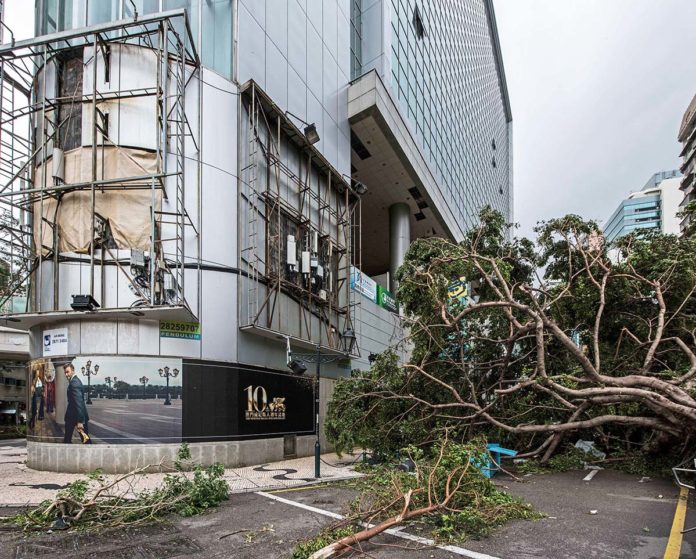In the aftermath of Typhoon Hato, destruction was evident throughout the city, with opinions about the government’s response to the disaster less than flattering from the perspective of foreign visitors, although some acknowledged its impact was somewhat unexpected.
Speaking to Business Daily, Catherine Chan, a doctoral student from the University of Bristol who came to Macau this week to conduct research on the local archives, said she was struck by how “unready Macau is for this” kind of event.
“The government seems too slow. I heard that Hong Kong had cleared up almost all the mess, but here nothing has been cleared at all,” claimed Chan at noontime yesterday, when she spoke to us.
At that time of the day, several roads were still blocked by fallen trees and branches, forcing several bus routes to be suspended.
People were seen walking to their destinations by the hundred.
Many parts of the city were out of water and power supply had not been completely restored.
Although some households and businesses got electricity back by the end of the day of the typhoon, other parts of the city were being shut down again yesterday evening.
Another foreign visitor who spoke to us, Frédéric Bordey, a musical producer based in France who was born and grew up in Martinique, in the Caribbean region, said he was “shocked by the lack of prevention on the part of the government.”
Bordey explained that a similar situation in the Caribbean, which is also a hazardous zone for hurricanes and earthquakes, would prompt “firefighters, the police, and the government itself to put safety measures in place 24 hours before the arrival of the typhoon, since today we have meteorological prevention tools for that.”
Mikael Kraemer, another visitor who has a long-term intermittent relationship with Macau, and who is currently the curator of an art exhibition in one of the casinos in town, said yesterday that “Hato has probably been the mostly destructive since 1946” and that “everyone has been taken by surprise.”
“We all want to help and volunteer for the city but we don’t know how we can help yet. We would need a central service to offer our time adapted to our skills to help the city recover in each area,” suggested Kraemer.
Bordey further claimed that in such cases of natural calamity in the Caribbean, people are “forbidden” to step outside, with the government further guaranteeing the necessary food and water provisions.
“The main problem here with the Hato was the government’s negligence,” he lamented, claiming that we should be “grateful” for not having found ourselves in a worse situation.
“I truly hope that this message will be heard to avoid an even bigger drama next time,” he said.
Kraemer and Bordey informed us later yesterday that they managed to collaborate with a local association by providing food supplies to be distributed to people in need.
Communication
Communication about the different stages and problems linked to the passage of Hato seems to have been one of the main problems, according to our sources.
“There were no government announcements whatsoever about the power cut, and no-one knew what was going on,” Chan claimed, adding that “the weather [services] webpage was always down and we could not check the weather [conditions].”
As for Bordey, he said the information about the whole situation was “mediocre.”
Chan, who has lived for many years in a city with a history of typhoons, Hong Kong, finally opined that the Macau SAR Government “needs more measures and backup plans for events like this, especially when Macau is so open and requires the bridge and or ferry to travel around.”
























